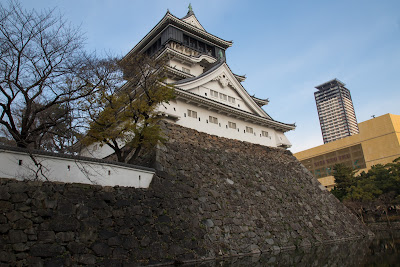Kokura Castle
-Gate to Kyushu island-
Overview
Name: Kokura castle (Kokura-jo)
Alias: Katsuyama-jo
Place: Jyonai, Kokura-kitaku Kitakyushu city, Fukuoka
Locatioon: 33.884545757029606, 130.87369715973531
Type: Flat castle
Built: Originally at 1569, expanded at 1609
Remaining remnants: Stone walls and water moats
Title: 100 more famous Japanese castles
Kokura (current Kitakyushu city) is an important place of communication because it locates on the way from Kyushu island to Honshu and is a place controls Kanmon straight. Originally governed by Ouchi clan during the first half of 16th century, but after the fall of Ouchi clan at 1551, Mouri clan of Aki province (Hiroshima prefecture) and Otomo clan of Bungo province (Oita prefecture) struggled for this area.
Formerly there was Moji castle just beside Kanmon straight, but in 1569 Mouri clan newly built a new castle in the place of Kokura. After that Otomo clan occupied this castle, and after the occupation of Kyushu by central ruler Hideyoshi Toyotomi (1537-1598) in 1587, his general Katunobu Mouri (?-1611, different from Mouri clan of Hiroshima area) was placed as a commander of Kokura castle.
Katsunobu transformed the castle into a modern one surrounded by stone walls, but Katsunobu and his son Katsunaga Mouri (1577-1615) supported Mitsunari Ishida (1560-1600) at the battle of Sekigahara and lost their territory and castle after the battle. Later Katsunobu Mouri participated in the battle of Osaka castle in 1614 and 1615 as Toyotomi side, and gallantly fought against overwhelming Tokugawa army along with Nobushige Sanada (1567-1615, famous as Yukimura Sanada).
Subsequent to the battle of Sekigahara at 1600, Buzen province (eastern half of Fukuoka prefecture) including Kokura castle was given to Tadaoki Hosokawa (1563-1646), who rendered remarkable result among the battle. Tadaoki built a main tower with four story and five floors, in Nanban style (Top floor overhangs from lower floor like tower of western castles) and moved from Nakatsu castle.
However, Hosokawa clan was transferred to Kumamoto castle at Higo province (Kumamoto prefecture) in 1632. After that Ogasawara clan, a hereditary clan of Tokugawa Shogunate became the commander of this castle. Their role was to watch the large lords located in Kyushu island and closed the road in case of rebellion.
In 1837, the main tower was lost by a fire. In addition to this, at the second campaign of Edo Shogunate against Mouri clan of Choshu domain (Yamaguchi prefecture) in 1866, due to a counterattack of Choshu army all buildings of Kokura castle were burned out.
Subsequent to Meiji revolution, Kokura castle was used as a base of Japanese Army. After WW2 castle area was used as a park, and main tower and palace building were reconstructed at 1959 and 1998, respectively.
20 minutes walk from Sanyo Shinkansen line / JR Kyushu Kagoshima Honsen line Kokura station. 20 minutes drive from Kyushu Jidoshado Expressway Nagano interchange.
Nakatsu Castle -Castle built by Hideyoshi's excellent military staff-
Kumamoto Castle -Complete style of Japanese castle as military fortress-
Type: Flat castle
Built: Originally at 1569, expanded at 1609
Remaining remnants: Stone walls and water moats
Title: 100 more famous Japanese castles
Brief History
Kokura (current Kitakyushu city) is an important place of communication because it locates on the way from Kyushu island to Honshu and is a place controls Kanmon straight. Originally governed by Ouchi clan during the first half of 16th century, but after the fall of Ouchi clan at 1551, Mouri clan of Aki province (Hiroshima prefecture) and Otomo clan of Bungo province (Oita prefecture) struggled for this area.
Formerly there was Moji castle just beside Kanmon straight, but in 1569 Mouri clan newly built a new castle in the place of Kokura. After that Otomo clan occupied this castle, and after the occupation of Kyushu by central ruler Hideyoshi Toyotomi (1537-1598) in 1587, his general Katunobu Mouri (?-1611, different from Mouri clan of Hiroshima area) was placed as a commander of Kokura castle.
Katsunobu transformed the castle into a modern one surrounded by stone walls, but Katsunobu and his son Katsunaga Mouri (1577-1615) supported Mitsunari Ishida (1560-1600) at the battle of Sekigahara and lost their territory and castle after the battle. Later Katsunobu Mouri participated in the battle of Osaka castle in 1614 and 1615 as Toyotomi side, and gallantly fought against overwhelming Tokugawa army along with Nobushige Sanada (1567-1615, famous as Yukimura Sanada).
Subsequent to the battle of Sekigahara at 1600, Buzen province (eastern half of Fukuoka prefecture) including Kokura castle was given to Tadaoki Hosokawa (1563-1646), who rendered remarkable result among the battle. Tadaoki built a main tower with four story and five floors, in Nanban style (Top floor overhangs from lower floor like tower of western castles) and moved from Nakatsu castle.
However, Hosokawa clan was transferred to Kumamoto castle at Higo province (Kumamoto prefecture) in 1632. After that Ogasawara clan, a hereditary clan of Tokugawa Shogunate became the commander of this castle. Their role was to watch the large lords located in Kyushu island and closed the road in case of rebellion.
In 1837, the main tower was lost by a fire. In addition to this, at the second campaign of Edo Shogunate against Mouri clan of Choshu domain (Yamaguchi prefecture) in 1866, due to a counterattack of Choshu army all buildings of Kokura castle were burned out.
Subsequent to Meiji revolution, Kokura castle was used as a base of Japanese Army. After WW2 castle area was used as a park, and main tower and palace building were reconstructed at 1959 and 1998, respectively.
Access
20 minutes walk from Sanyo Shinkansen line / JR Kyushu Kagoshima Honsen line Kokura station. 20 minutes drive from Kyushu Jidoshado Expressway Nagano interchange.
Related Castles
Nakatsu Castle -Castle built by Hideyoshi's excellent military staff-
Kumamoto Castle -Complete style of Japanese castle as military fortress-

















































































































































































No comments:
Post a Comment